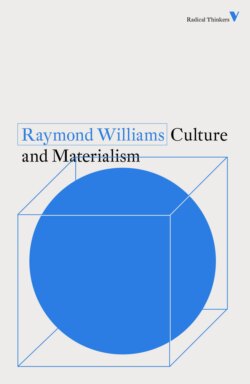Читать книгу Culture and Materialism - Raymond Williams - Страница 25
На сайте Литреса книга снята с продажи.
Objects and Practices
ОглавлениеNow I think the true crisis in cultural theory, in our own time, is between this view of the work of art as object and the alternative view of art as a practice. Of course it is at once argued that the work of art is an object: that various works have survived from the past, particular sculptures, particular paintings, particular buildings, and these are objects. This is of course true, but the same way of thinking is applied to works which have no such singular existence. There is no Hamlet, no Brothers Karamazov, no Wuthering Heights, in the sense that there is a particular great painting. There is no Fifth Symphony, there is no work in the whole area of music and dance and performance, which is an object in any way comparable to those works in the visual arts which have survived. And yet the habit of treating all such works as objects has persisted because this is a basic theoretical and practical presupposition. But in literature (especially in drama), in music and in a very wide area of the performing arts, what we permanently have are not objects but notations. These notations have then to be interpreted in an active way, according to the particular conventions. But indeed this is true over an even wider field. The relationship between the making of a work of art and its reception is always active, and subject to conventions, which in themselves are forms of (changing) social organization and relationship, and this is radically different from the production and consumption of an object. It is indeed an activity and a practice, and in its accessible forms, although it may in some arts have the character of a singular object, it is still only accessible through active perception and interpretation. This makes the case of notation, in arts like drama and literature and music, only a special case of a much wider truth. What this can show us here about the practice of analysis is that we have to break from the common procedure of isolating the object and then discovering its components. On the contrary we have to discover the nature of a practice and then its conditions.
Often these two procedures may in part resemble each other, but in many other cases they are of radically different kinds, and I would conclude with an observation on the way this distinction bears on the Marxist tradition of the relation between primary economic and social practices, and cultural practices. If we suppose that what is produced in cultural practice is a series of objects, we shall, as in most current forms of sociological-critical procedure, set about discovering their components. Within a Marxist emphasis these components will be from what we have been in the habit of calling the base. We then isolate certain features which we can so to say recognize in component form, or we ask what processes of transformation or mediation these components have gone through before they arrived in this accessible state.
But I am saying that we should look not for the components of a product but for the conditions of a practice. When we find ourselves looking at a particular work, or group of works, often realizing, as we do so, their essential community as well as their irreducible individuality, we should find ourselves attending first to the reality of their practice and the conditions of the practice as it was then executed. And from this I think we ask essentially different questions. Take for example the way in which an object—‘a text’—is related to a genre, in orthodox criticism. We identify it by certain leading features, we then assign it to a larger category, the genre, and then we may find the components of the genre in a particular social history (although in some variants of criticism not even that is done, and the genre is supposed to be some permanent category of the mind).
It is not that way of proceeding that is now required. The recognition of the relation of a collective mode and an individual project—and these are the only categories that we can initially presume—is a recognition of related practices. That is to say, the irreducibly individual projects that particular works are, may come in experience and in analysis to show resemblances which allow us to group them into collective modes. These are by no means always genres. They may exist as resemblances within and across genres. They may be the practice of a group in a period, rather than the practice of a phase in a genre. But as we discover the nature of a particular practice, and the nature of the relation between an individual project and a collective mode, we find that we are analysing, as two forms of the same process, both its active composition and its conditions of composition, and in either direction this is a complex of extending active relationships. This means, of course, that we have no built-in procedure of the kind which is indicated by the fixed character of an object. We have the principles of the relations of practices, within a discoverably intentional organization, and we have the available hypotheses of dominant, residual and emergent. But what we are actively seeking is the true practice which has been alienated to an object, and the true conditions of practice—whether as literary conventions or as social relationships—which have been alienated to components or to mere background.
As a general proposition this is only an emphasis, but it seems to me to suggest at once the point of break and the point of departure, in practical and theoretical work, within an active and self-renewing Marxist cultural tradition.
